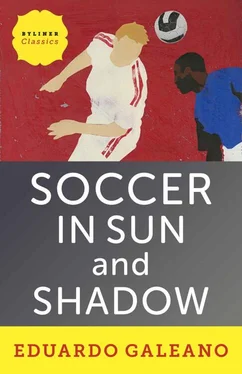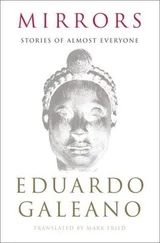Afterward, the grass at Saint Denis was sold off in slices, just as at the previous Cup in Los Angeles. The author of this book has no loaves of lawn to sell, but he would like to offer, free of charge, a few morsels of soccer that also had something to do with this championship.
Stars
The most famous soccer players are products who sell products. Back in Pelé’s day, players played and that was all, or nearly all. By Maradona’s time, television and advertising already held sway and things had changed. Maradona charged a high price and paid one as well. He charged for his legs, and paid with his soul.
At fourteen, Ronaldo was a poor mulatto from the slums of Rio de Janeiro, with rabbit teeth and the legs of a great striker, who couldn’t play for Flamengo because he did not have the bus fare. At twenty-two he was making a thousand dollars an hour, even while he slept. Overwhelmed by his own popularity and the pressure of money, obliged to always shine and always win, Ronaldo suffered a nervous breakdown with violent convulsions hours before the ’98 Cup was decided. They say Nike forced him to take the field in the final against France. He played but he didn’t. And he could not demonstrate the virtues of Nike’s new line of shoes, the R-9, being marketed on his feet.
Prices
At the end of the century, soccer reporters write less about players’ abilities and more about the prices they command. Club presidents, businessmen, contractors, and related fishmongers crowd the soccer columns. Until a few years ago “pass” referred to the movement of the ball from one player to another. Now it alludes more to the movement of a player from one club to another, or one country to another. What’s the return on investment in the stars? Soccer columnists bombard us with the vocabulary of the times: offer, buyout, option to buy, sale, foreclosure, appreciation, depreciation. During the 1998 World Cup, TV screens across the globe were invaded and overwhelmed by collective emotion, the most collective of emotions. But they were also turned into tradeshow displays. There were ups and downs in leg futures.
Hired Feet
Joseph Blatter, soccer’s new monarch, gave an interview to the Brazilian magazine Placar at the end of 1995, while he was still Havelange’s right-hand man. The journalist asked about the international players union being organized.
“FIFA doesn’t deal with players,” Blatter responded. “Players are employees of the clubs.”
While Blatter the bureaucrat offered his disdain, there was good news for the athletes and for all of us who believe in human rights and freedom for labor. In a suit brought by Belgian soccer player Jean-Marc Bosman, Europe’s highest judicial authority, the European Court of Justice, ruled that European players could become free agents at the ends of their contracts.
Later on, Brazil’s “Pelé Law” further weakened the chains of feudal servitude. But in many countries, players are still treated as fixed assets of the clubs, most of which are companies disguised as nonprofit organizations.
Just before the ’98 Cup, one manager, Pacho Maturana, offered this opinion: “Nobody thinks about players’ rights.” That continues to be a truth as large as a house and as vast as the world, even though at long last players are winning the right to free agency. The higher a player goes in professional soccer, the greater are his obligations, always more numerous than his rights. He must live by the decisions of others, suffer military discipline, exhausting training, and incessant travel, and play day after day after day, always in top form, producing ever more.
When Winston Churchill reached the age of ninety, buoyant as ever, a journalist asked him the secret of his good health. “Sports,” Churchill responded. “I never played them.”
Advertisements
In today’s world, everything that moves and everything that doesn’t carries some sort of commercial message. Every soccer player is a billboard in movement, but FIFA expressly prohibits players from wearing messages of solidarity. Julio Grondona, the boss of Argentine soccer, reminded us all of this in 1997, when a few players tried to show their support for the demands of the country’s teachers, who earn salaries of perpetual fasting. Not long before that, FIFA fined the English player Robbie Fowler for the crime of writing on his shirt a slogan in support of striking stevedores.
Roots
Many of soccer’s greatest stars suffer discrimination because they are black or mulatto. On the field they find an alternative to the life of crime to which they had been condemned by statistical average, and thus they become symbols of collective hope.
A recent survey in Brazil showed that two out of three professional players never finished primary school. Many of these — half — have black or brown skin. Despite the invasion of the middle class evident lately on the field, Brazilian soccer today is not very different from the days of Pelé, who as a child used to steal peanuts in the train station.
Africans
Njanka, from Cameroon, took off from the back, left the entire population of Austria in the dust, and scored the prettiest goal of the ’98 Cup. But Cameroon itself did not go far.
When Nigeria, with its joyous soccer, defeated the Spanish team, and Paraguay fought Spain to a tie, Spain’s President José María Aznar commented, “Even a Nigerian, even a Paraguayan could take your place.” Then, when Nigeria was knocked out of the running, an Argentine commentator decreed, “They’re all bricklayers, not one of them uses his head to think.”
FIFA, which gives awards for fair play, did not play fair with Nigeria. Even though the team had just won the Olympics, they would not let it be seeded at the top of its group.
Black Africa’s teams left the World Cup early, but Africa’s children and grandchildren continued to shine on the teams of the Netherlands, France, Brazil, and others. Some commentators called them darkies. They never called the others whiteys.
Fervor
In April 1997 guerrillas occupying the Japanese embassy in the city of Lima were gunned down. When commandos burst in and carried out their spectacular lightning butchery, the guerrillas were playing soccer. Their leader, Néstor Cerpa Cartolini, died wearing the colors of Alianza, the club he loved.
Few things happen in Latin America that do not have some direct or indirect relation with soccer. Whether a shared celebration or a shipwreck that takes us all down, soccer counts in Latin America, sometimes more than anything else, even if the ideologues who love humanity but can’t stand people don’t realize it.
Latin Americans
Mexico played well in the ’98 Cup. Paraguay and Chile were tough bones to chew. Colombia and Jamaica gave it their best. Brazil and Argentina gave it a lot less than their best, handcuffed by strategies that were rather stingy in joy and fantasy. On the Argentine squad all joy and fantasy fell to Ortega, master of gambols and arabesques but a crummy actor when it comes to rolling on the ground.
Dutch
Of the Latin American teams, to tell the truth, the one I liked best was the Netherlands. The orange offered a feast for the eyes, with good footwork and quick passes, luxuriating in the ball. Their style was due, in large part, to the contribution of players from South America, descendants of slaves born in Suriname.
There were no blacks among the ten thousand Dutch fans who traveled to France, but there certainly were on the field: Kluivert, Seedorf, Reiziger, Winter, Bogarde, Davids. The engine of the team, Davids plays and makes plays: he gets his goals and gets in trouble, because he will not accept that black players earn less than white ones.
Читать дальше












